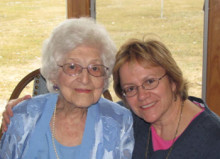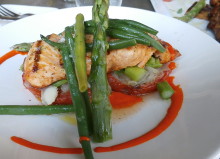Eating Out of Control? Blame Eating, Not Food!

Today’s post is written by Karen Koenig, author of Outsmarting Overeating: Boost Your Life Skills, End Your Food Problems. I was so impressed by this book that I have scheduled a group coaching tele-class on June 22nd based on its principles. The tele-class will allow members to study the book together in a small, professionally facilitated, confidential environment. Benefits include group support, awareness-building, accountability, and access to my services as an experienced Registered Dietitian wellness coach. Please see the end of the article for more info.
Eating, Not Food, is the Problem by Karen Koenig, LCSW, Med
If you’ve put on weight and are thinking that food is your main problem, think again. Sugar and fat have been the culprits in our “war on obesity” for such a long time that we’ve come to take for granted that the blame goes squarely on their non-nutritious shoulders. However, eating disorder therapists like myself recognized more than three decades ago that our difficulties are more about our relationship with food than about the food itself. And now we have science to back it up.
According to “Eating, not sugar, is addictive” (The Guardian online, 9/9/14), it’s our dependence, addiction, habituation — whatever you want to call it — to the process of eating that is packing the pounds on our bodies, not the ingredients in the foods we eat. Researchers at the University of Edinburgh have concluded that “the real problem underlying our unhealthy food consumption is the psychological compulsion to eat because of the pleasure and satisfaction we get from food,” comparing our overeating and mindless munching to the mental processes that drive gamblers to gamble. Says, Dr. John Menzies, Research Fellow in the University of Edinburgh’s Centre for Integrative Psychology, “More avenues for treatment may open up if we think about this condition as a behavioral rather than a substance-based addiction.”
This new perspective turns our struggles with the scale into a problem that can be solved, not by dieticians focused on what we eat, but by therapists focused on why and how we do it. This clinical sub-specialty, known as the psychology of eating, involves understanding the impact of everything else in a person’s life on his/her ability to establish a comfortable, rational ability to feed themselves effectively. This wide-angle lens exploration includes, but is not limited to, life stressors and coping strategies, how much sleep we get each night, the ability to regulate our emotions and build support systems, resolution of trauma, abuse and neglect, especially in childhood, our fears of intimacy and sexuality, weight stigma and weight-loss pressures, and mindful eating.
Therapists who deal with binge-eating and overeating are often considered the step-children of the “war on obesity.” Nutrition, fitness experts, abstinence programs like Overeaters Anonymous, bariatric surgery, and doctors with their prescription pads at the ready have been viewed as the bona fide leaders in the fight against fat. Therapeutic methods are seen as taking too long-term, not sufficiently outcome oriented, and based more on art than science.
It’s true that changing behavior takes time and is no quick fix for eating and weight struggles. But redefining these problems as psychological and behavioral rather than as diseases or addictions is a start — a grand start — and can go a long way toward giving society the message that there are no easy answers or solutions to obesity such as take this pill or simply eat this and not that. Rather, a therapeutic perspective with more breadth and depth teaches people how to improve their rest of their lives so that eating is kept in its rightful place, which is for nourishment and occasional pleasure.
From my 30-plus years of clinical experience, I have developed a five-pronged approach for teaching people to become “normal” eaters:
- Follow guidelines that relate to appetite, not external good-food-bad-food rules, to include eating when you’re hungry, choosing satisfying foods, eating with awareness and enjoyment, and stopping when you’re full or satisfied.
- Establish beliefs about eating, food, and body appearance which are rational and which produce positive feelings and appropriate behaviors; developing core beliefs which are healthy and life-enhancing.
- Become successful at emotional management, which means building internal resources for handling stress and distress, comfortably seeking and accepting support from others, and reducing stressors to make life more satisfying and enjoyable.
- Resolve underlying, conflicting feelings in order to engage in permanent, positive self care, specifically ambivalence about giving up food for comfort and coping, what you deserve in life, doing the work that brings lasting change, intimacy and sexuality, knowing what’s enough in every aspect of life, and your identity.
- Gain effective life skills to manage life’s ups and downs to increase competence and confidence to discourage turning to food when you’re stressed or distressed because you have far more effective strategies.
When we stop looking at food as the enemy and figure out what drives our non-hunger eating, we finally have a chance to normalize and improve our relationship with food once and for all. It is this understanding, outside of the food arena, that will provide the answers to why we snack mindlessly, drift from diet to diet, struggle with the scale, and find ourselves slipping from self-care to “I don’t care.” Rather than obsess about food and weight, it’s time to pay more attention to bigger problems and get rest of life in working order. Once that happens, our eating will take care of itself.
Karen R. Koenig, LCSW, MEd, is the author of Outsmarting Overeating as well as five other books about eating and weight. A psychotherapist, eating coach, and speaker, she has been working with troubled eaters for over 30 years. A frequently quoted expert in both the popular media and professional literature, she lives in Sarasota, Florida. Visit her online at http://www.karenrkoenig.com.
Based on the book Outsmarting Overeating: Boost Your Life Skills, End Your Food Problems ©2015 by Karen R. Koenig.
Note from Bev: If you would like to learn to rein in your eating habits (emotional over-eating, stress-eating, mindless snacking, sugar binges, etc.), please consider taking my Outsmarting Overeating tele-class, which starts June 22nd. As a Registered Dietitian who learned long ago that “food is not the problem”, I will use my 28 years of experience to coach you toward success using principles outlined in Karen’s book. Please know I am not concerned about your weight, your BMI or your past “failures.” This class is about moving forward through a better relationship with food. (Note: I am not a therapist, and will only address issues within my scope of practice.)
Because this tele-class takes place by bridgeline, you can call in from almost any geographical location. I offer both daytime and evening sessions, and also create customized groups for groups of at least 4 people. For more information, please click here. I also provide one-on-one coaching for this challenge.
Remember, class starts June 22nd, and registration is due June 15th, so check it out today! Questions? I’m just an email away at [email protected]
Photo credit: MorgueFile.com























































